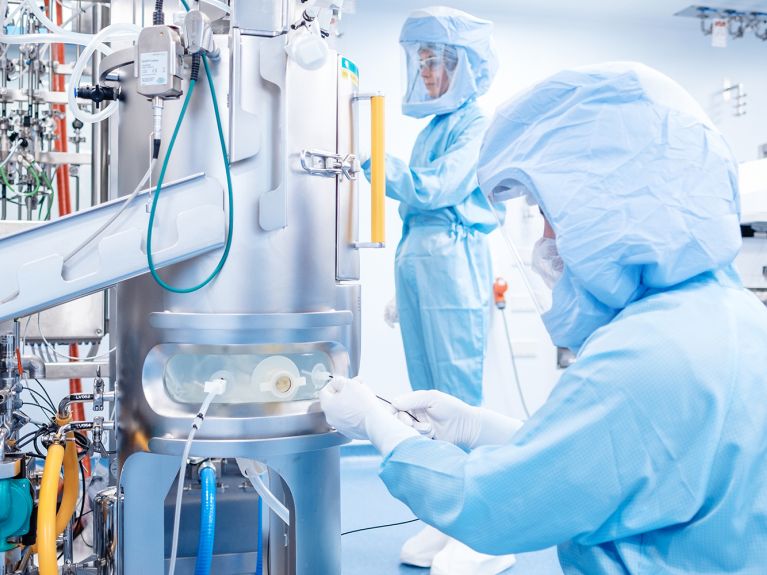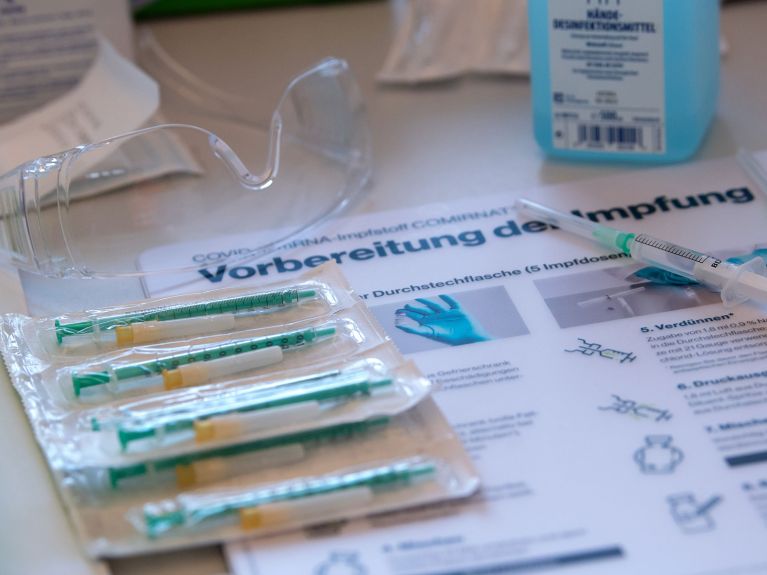The corona hunters from Germany
Biontech and Curevac have made a name for themselves in COVID-19 vaccine development. Read here what makes these companies special.

The doctors Uğur Şahin and Özlem Türeci never intended to found a vaccine production company. The two Mainz University researchers, who are partners in both their private and professional lives, were aiming for something rather different when they presented their idea for a new pharmaceutical enterprise to investors in autumn 2007. Şahin und Türeci, whose parents came to Germany from Turkey, aimed to do nothing less than revolutionise the treatment of cancer with their Biontech company. The investors were certainly taken with the idea. At the time, a new kind of cancer therapy was a far more ambitious and a far more commercial goal than working on a vaccine against a lung disease that was spread by a virus would ever have been.
That suddenly changed when COVID-19 was diagnosed for the first time and Chinese researchers published the genome of the coronavirus in January 2020. Şahin and Türeci did not hesitate very long at the Biontech headquarters in Mainz. They decided to undertake a new research programme and gave it the name Lightspeed. That sounds like an exaggeration, but it was an appropriate description, because just a few weeks later what eventually proved to be the right active ingredient was found in the Biontech laboratory. Clinical trials began on tens of thousands of volunteers before the end of spring, and the overwhelmingly positive results already became available in November. Finally, in December a large number of countries began launching the vaccination campaigns on which many are now pinning their hopes of overcoming the pandemic.
26 projects in Germany alone
It normally takes several years to develop a new vaccine. In this case, it was accomplished in a record time of less than twelve months. In all, the World Health Organization (WHO) has counted over 240 projects aimed at developing a corona vaccine, including 26 in Germany. None of them achieved their goal faster than Biontech.

Although the BNT 162b2 vaccine has been developed, manufactured and distributed jointly with Pfizer, the large US pharma company with a global organisation, the intellectual property rights to the vaccine are held by Biontech, a much smaller startup founded by Uğur Şahin and Özlem Türeci from Mainz that had previously not launched a single medicine on the market. Two aspects make Biontech’s success especially remarkable. First, it meant that a company which was completely new to this field overtook a raft of experienced international vaccine manufacturers, such as Sanofi from France and Glaxo-Smith-Kline (GSK) and Astra-Zeneca from the United Kingdom. Second, a new kind of technology, one that uses messenger RNA (mRNA), proved superior to other, time-tested approaches.
Biontech uses a new technology: mRNA
The Biontech corona vaccine is the world’s first approved medicine that uses this technology. The use of ribonucleic acid here, a kind of sister to the deoxyribonucleic acid (DNA) that carries genetic information, supplies the body with a genetic blueprint that enable it to protect itself against viruses or other diseases. Uğur Şahin and Özlem Türeci have been working on this idea for some years in an effort to develop new cancer drugs.
However, the two researcher-entrepreneurs from Mainz are not the only scientists in Germany working on this technology. Located in Tübingen, only 250 kilometres southwest of Mainz, is the headquarters of Curevac, the biotech company that was founded in 2000 by the molecular biologist Ingmar Hoerr. Hoerr is an mRNA pioneer of the first hour who focused his firm on the possibilities of this technology from the very outset. He also set himself the goal of using it
to develop a corona vaccine very early on. The German Federal Government even took the very unusual step of investing 300 million euros in the company to keep it in the country on a permanent basis.
However, its next steps on the path to possible approval and market launch did not succeed quite as fast as they did for Biontech. Meanwhile, however, Curevac has concluded an alliance with Bayer, the large German pharma company, to advance the development of its CVnCoV vaccine candidate. Curevac is also cooperating with GSK from the United Kingdom. The results of the clinical study should become available in mid-2021, and if everything goes well, the Curevac corona vaccine will also be approved then.
Research successes increase stock-market value
As a result of their efforts in the fight against the corona pandemic, Curevac and Biontech have become the best known biotech companies in Germany. They share a number of other interesting common features. Both firms are majority owned by German billionaires: SAP founder Dietmar Hopp has been a major shareholder in Curevac for many years, while the pharma entrepreneurs Thomas and Andreas Strüngmann were founding investors in Biontech. Both companies have been working with the Bill and Melinda Gates Foundation for some time. Curevac is developing vaccines against malaria and the Rotavirus with the foundation, while Biontech wants to make progress on vaccines against tuberculosis and HIV. The two companies were recently listed on the NASDAQ Stock Exchange in New York, where in mid-January Curevac was worth roughly 18 billion dollars and Biontech nearly 25 billion dollars.
Ministry funds research
Germany’s Federal Ministry of Education and Research eventually decided to give both Curevac and Biontech massive funding to accelerate the development and production of corona vaccines. In all, up to 750 million euros have been allocated for 2020 and 2021 as part of a special programme. With the same programme, the ministry is also supporting a third company that has made the headlines much less often: IDT Biologika from Dessau in Saxony-Anhalt. Founded in 1921 and owned by a family
of entrepreneurs, the firm normally manufactures medicines to order for other pharmaceutical businesses, but is now attempting to develop its own vaccine. It is using a conventional process based on a strain of smallpox virus that has been used in vaccines for decades. The approval procedure for this vaccine could begin at the end of 2021 at the earliest, but probably only in 2022. That is not the speed of light. But, on the other hand, the vaccine from Dessau could one day be much less expensive to produce and easier to handle than BNT 162b2 from Mainz and CVnCoV from Tübingen.
You would like to receive regular information about Germany? Subscribe here:


